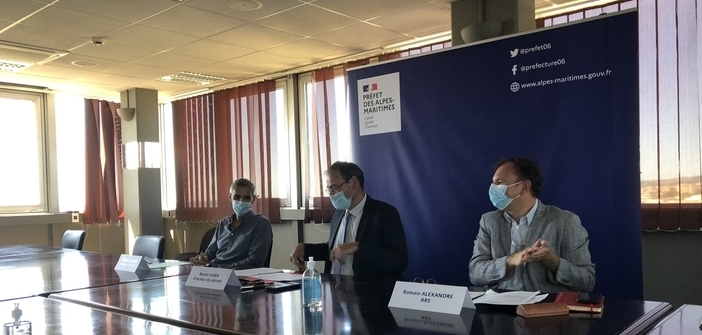The prefecture announces a figure of 52% for first-time vaccinated individuals and 32% for a “complete vaccination scheme.” For several weeks now, epidemiological indicators have remained positive. The same cannot be said for the vaccination campaign, which has hit a bit of a snag. That is why the authorities have emphasized the importance of getting vaccinated.
“The COVID page is far from being turned.” The chief of staff of the prefect, Benoît Huber, believes that the mobilization must continue. Similarly, Professor Carles emphasizes the importance of vaccination: “to protect the most at-risk individuals.” Those individuals may or may not have comorbidities. As of today, 65% have been vaccinated.
A decrease in spread… to be taken with caution
It’s true that the numbers are reassuring. However, one must not count their chickens before they hatch. On the one hand, the incidence rate is 15 infected per 100,000 inhabitants. Caution is required because “last year during the same period, it was five, which is three times less than today,” recalls Professor Michel Carles, an infectious disease specialist at the Nice University Hospital. Currently, there have been 1,528 hospital deaths since the start of the epidemic.
Today, the Delta variant is causing major concern among doctors. “Among the tests conducted, about 23% were from the Delta variant (formerly Indian) in the PACA region. We have sporadic cases, but also sometimes clustered cases,” explains the Regional Health Agency director Romain Alexandre. Such is the case in Antibes, at a dance school. Among the 200 people tested, 16 are considered positive cases.
Hospital pressure is also nearly nonexistent. “Medical capacities have returned to the adequate format,” adds Romain Alexandre. But a reduction does not mean elimination. The goal is to keep an eye on the evolution of cases. “Investigations are being conducted to identify cases. We wanted to remind people of the necessity to answer health insurance questions.”
A vaccination that is floundering
For about two weeks, the pace has slowed down. “We’re vaccinating around 12,000 to 13,000 weekly, but at the same time, we have 43,000 people coming for the second dose,” observes Benoît Huber.
Meanwhile, there is no longer saturation in scheduling appointments. Deliveries follow their normal course with 50,000 to 70,000 vaccines delivered weekly. This means supply exceeds demand. “We have a stock that allows us to vaccinate beyond deliveries.”
To try to encourage people, mediators will be put in place. This comes with an “experiment at Cap 3000. The sales period will generate interest in getting vaccinated.” It will serve to “promote” arranging appointments or seeking information.
And people remain skeptical
On this subject, Professor Michel Carles, an infectious disease specialist at the Nice University Hospital, did not hesitate to make a point. “We want people to protect themselves from this disease. As long as we’re not protected, we maintain barrier gestures. Otherwise, what happened in England will happen here too. We’ll relive the same situation. It’s astonishing!” According to the latest estimates, “there have been three billion injections worldwide.”
To curb this phenomenon, tighter measures may be necessary in the near future. Meanwhile, the infectious disease specialist at Nice University Hospital compares barrier gestures to a “bulletproof vest.” The prefect is also on the same wavelength. He too is ready to act if figures worsen. “We are considering whether we will have to impose masks at events like concerts. We are in favor of it,” justifies the chief of staff of the prefect.
The issue of international flight checks also remains on the agenda. “A control system has been set up upon arrival. It allows us to check lists of passengers from different countries according to several criteria.” Approximately 1,314 isolation orders have been issued. “These checks are carried out by the police and gendarmerie. So far, we’ve issued 183 fines,” explains Benoit Huber.


